2017年中考英语语法复习课件 句子种类
文档属性
| 名称 | 2017年中考英语语法复习课件 句子种类 |

|
|
| 格式 | zip | ||
| 文件大小 | 760.5KB | ||
| 资源类型 | 教案 | ||
| 版本资源 | 通用版 | ||
| 科目 | 英语 | ||
| 更新时间 | 2017-04-09 00:00:00 | ||
图片预览

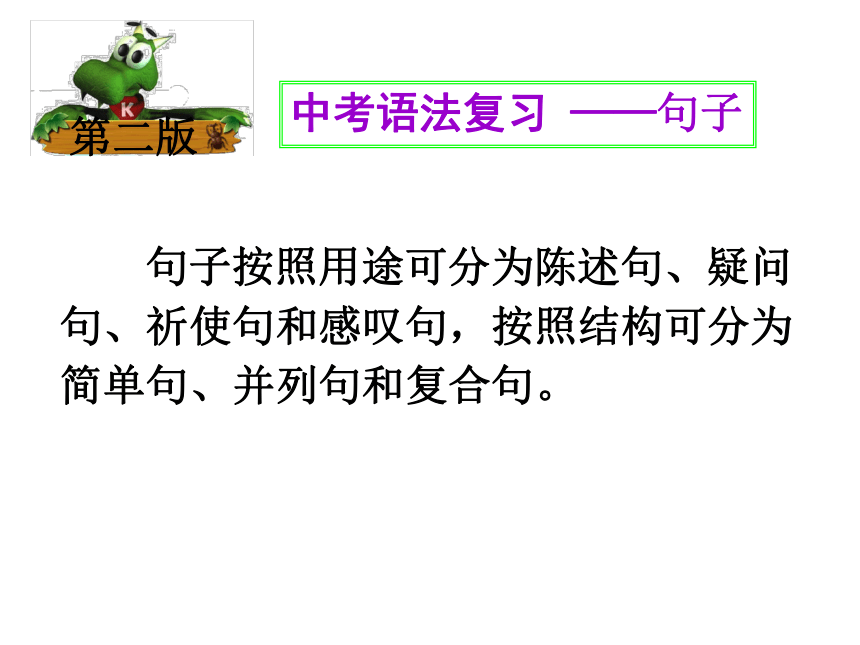
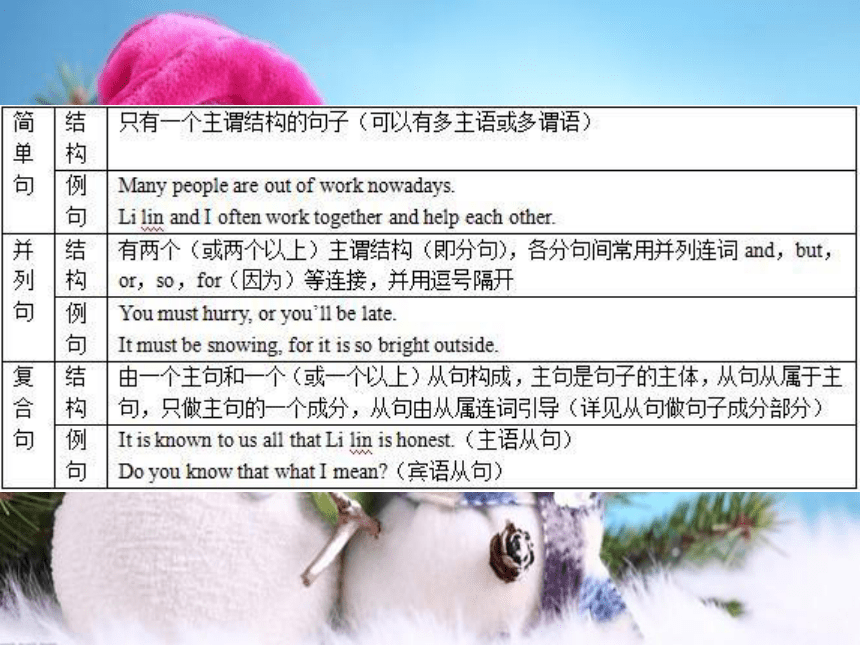
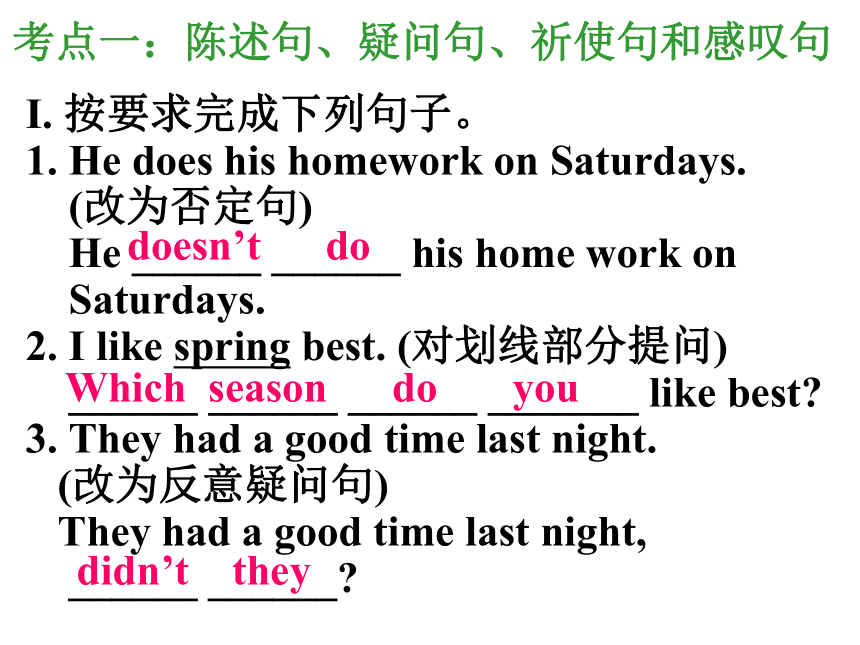
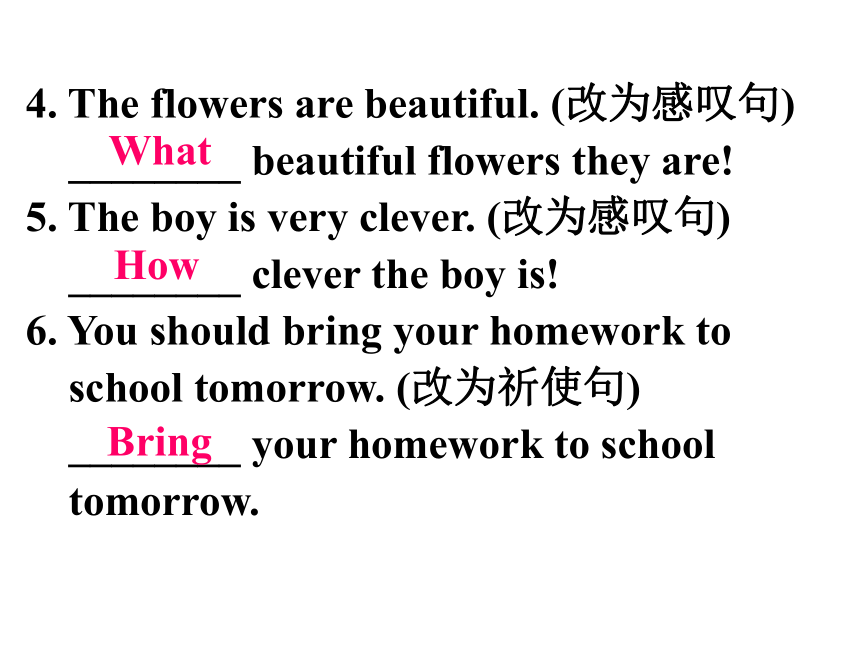

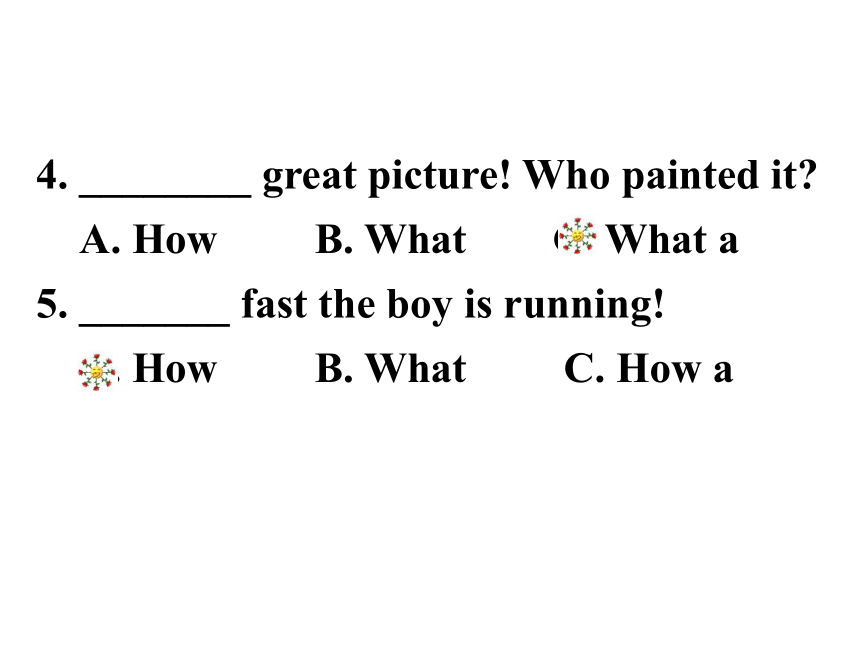
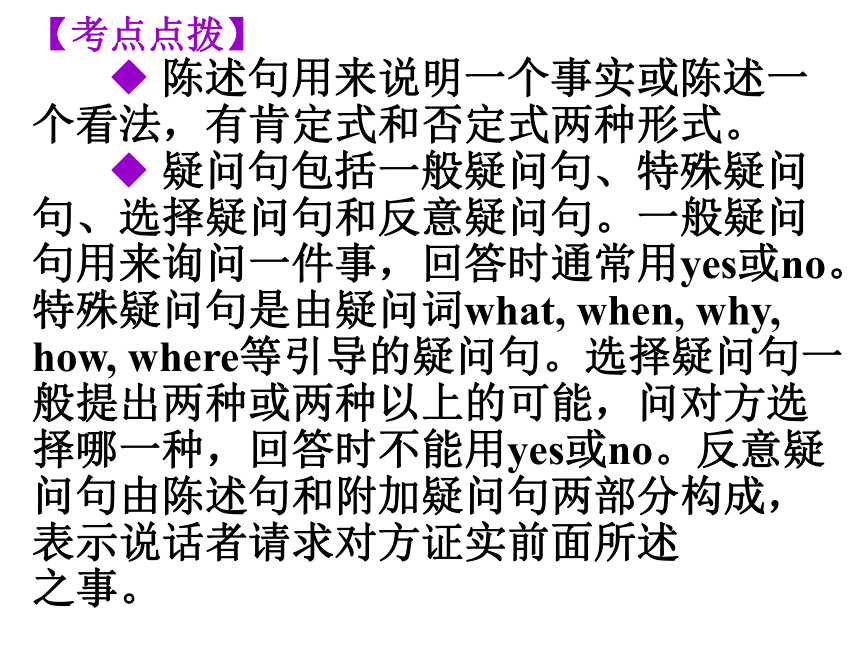
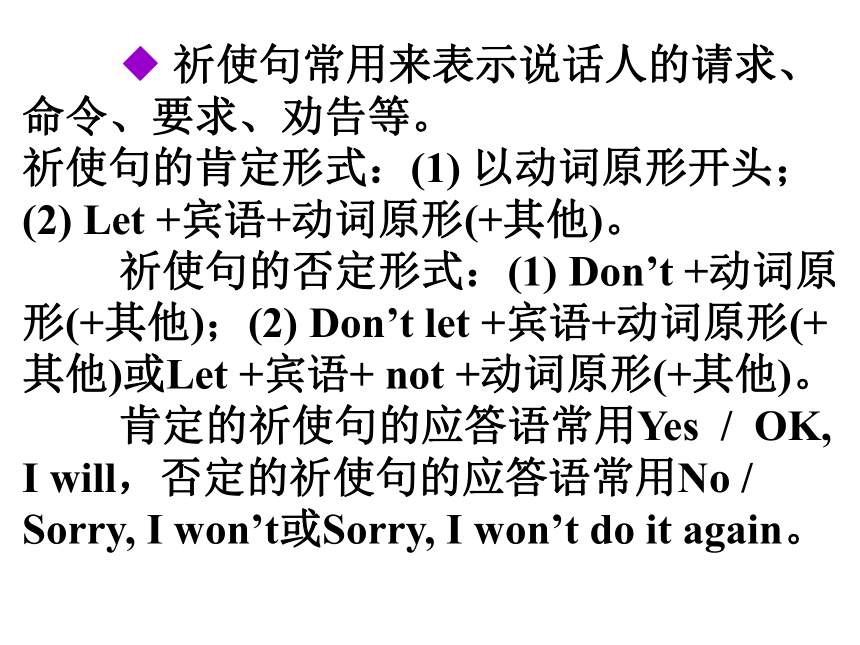
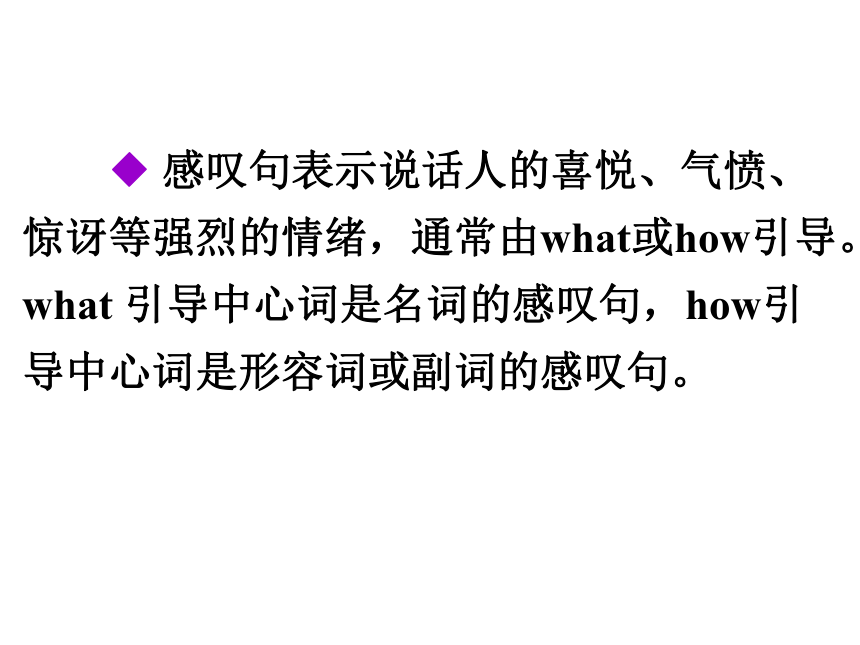
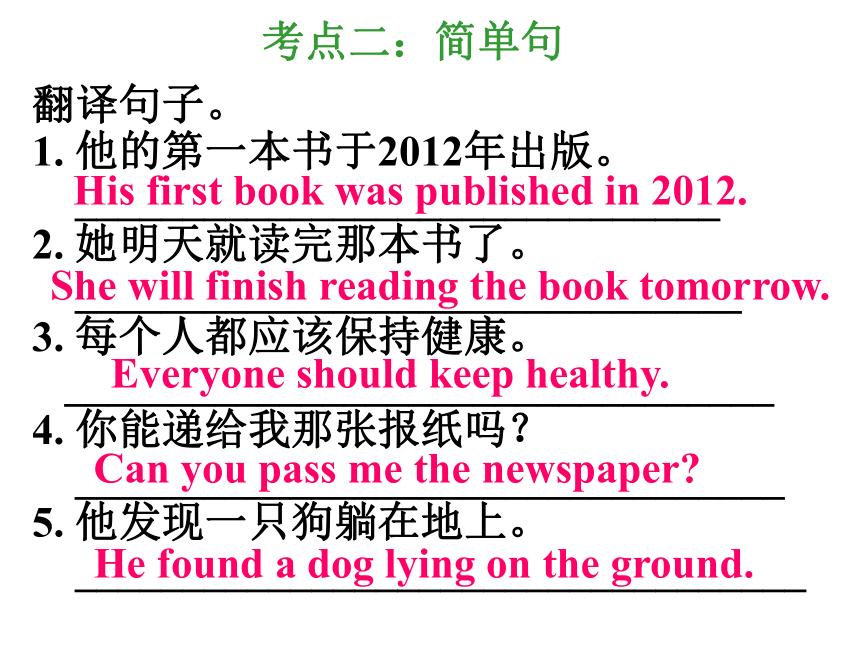
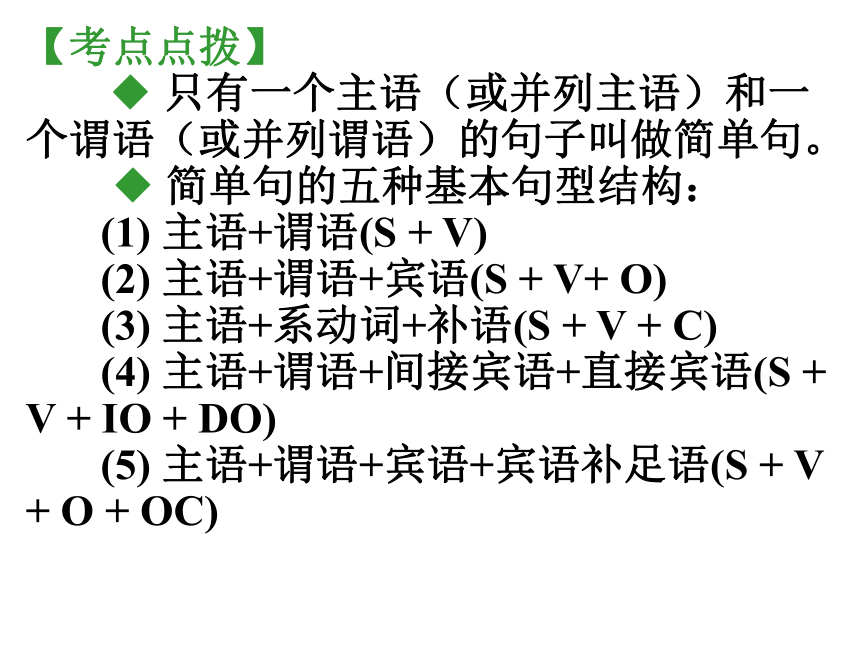
文档简介
课件56张PPT。第二版中考语法复习 ——句子 句子按照用途可分为陈述句、疑问句、祈使句和感叹句,按照结构可分为简单句、并列句和复合句。Ⅰ. 按要求完成下列句子。
He does his homework on Saturdays.
(改为否定句)
He ______ ______ his home work on
Saturdays.
2. I like spring best. (对划线部分提问)
______ ______ ______ _______ like best?
They had a good time last night.
(改为反意疑问句)
They had a good time last night,
______ ______?考点一:陈述句、疑问句、祈使句和感叹句doesn’t do Which season do you didn’t they4. The flowers are beautiful. (改为感叹句)
________ beautiful flowers they are!
5. The boy is very clever. (改为感叹句)
________ clever the boy is!
6. You should bring your homework to
school tomorrow. (改为祈使句)
________ your homework to school
tomorrow.WhatHowBringⅡ. 选择填空。
— Did you use to have long hair or short
hair, Sally?
— __________.
A. Yes, I did B. No, I didn't
C. Long hair
2. _______ away from the lake, boys. It is
deep.
A. Stays B. Stay C. To stay
3. ________ wake up your sister, Ben. She
needs a good sleep.
A. Don’t B. Doesn’t C. Can’t 4. ________ great picture! Who painted it?
A. How B. What C. What a
5. _______ fast the boy is running!
A. How B. What C. How a【考点点拨】
◆ 陈述句用来说明一个事实或陈述一个看法,有肯定式和否定式两种形式。
◆ 疑问句包括一般疑问句、特殊疑问句、选择疑问句和反意疑问句。一般疑问句用来询问一件事,回答时通常用yes或no。特殊疑问句是由疑问词what, when, why, how, where等引导的疑问句。选择疑问句一般提出两种或两种以上的可能,问对方选择哪一种,回答时不能用yes或no。反意疑问句由陈述句和附加疑问句两部分构成,表示说话者请求对方证实前面所述
之事。 ◆ 祈使句常用来表示说话人的请求、命令、要求、劝告等。
祈使句的肯定形式:(1) 以动词原形开头;
(2) Let +宾语+动词原形(+其他)。
祈使句的否定形式:(1) Don’t +动词原形(+其他);(2) Don’t let +宾语+动词原形(+其他)或Let +宾语+ not +动词原形(+其他)。
肯定的祈使句的应答语常用Yes / OK, I will,否定的祈使句的应答语常用No / Sorry, I won’t或Sorry, I won’t do it again。 ◆ 感叹句表示说话人的喜悦、气愤、惊讶等强烈的情绪,通常由what或how引导。what 引导中心词是名词的感叹句,how引导中心词是形容词或副词的感叹句。翻译句子。
1. 他的第一本书于2012年出版。
______________________________
2. 她明天就读完那本书了。
_______________________________
3. 每个人都应该保持健康。
_________________________________
4. 你能递给我那张报纸吗?
_________________________________
5. 他发现一只狗躺在地上。
__________________________________考点二:简单句His first book was published in 2012. She will finish reading the book tomorrow. Everyone should keep healthy.Can you pass me the newspaper?He found a dog lying on the ground.【考点点拨】
◆ 只有一个主语(或并列主语)和一个谓语(或并列谓语)的句子叫做简单句。
◆ 简单句的五种基本句型结构:
(1) 主语+谓语(S + V)
(2) 主语+谓语+宾语(S + V+ O)
(3) 主语+系动词+补语(S + V + C)
(4) 主语+谓语+间接宾语+直接宾语(S + V + IO + DO)
(5) 主语+谓语+宾语+宾语补足语(S + V + O + OC) 选择填空。
1. Practice more, _______ you’ll do better
in playing chess.
A. but B. and C. or
2. Peter can play the piano, _______ he
can’t play it well.
A. and B. but C. or考点三:并列句3. Spend more time talking with your
parents, ________ they may not
understand you well .
A. or B. so C. and
4. It was raining heavily, ________ we
decided to stay at home and watch TV.
A. but B. or C. so【考点点拨】
◆ 并列句是由并列连词把两个或多个简单句连接而成的句子。
(1) 表示平行、同等的并列句中常用的连词有and, both … and, neither … nor …, not only … but also …等。
(2) 表示转折关系的并列句中常用的连词有but, while, yet等。
(3) 表示选择关系的并列句中常用的连词有or, either ... or…, not … but …等。
(4) 表示因果关系的并列句中常用的连词有so, for等。 选择填空。
Laura opened the door and rushed into
the rain ________ I could stop her.
A. until B. after C. before
2. I don’t know whether the shoes fit me
________ I try them on.
A. when B. if C. until
3. Why not look up the new word in a
dictionary _________ you don’t know it?
A. if B. that C. though 考点四:复合句4. In summer, milk will go bad quickly
________ it is put into a fridge.
A. after B. unless C. because
5. ________ I hurt my leg, ________ I
didn’t take part in the sports meeting.
A. Because; so B. Because; /
C. Though; but
6. The movie is ______ wonderful ________
I want to see it again.
A. too; to B. so; that C. as; as 7. The teacher asked me to read aloud
_________ all the students could hear me.
A. so that B. for C. because
8. __________ jeans were invented over
100 years ago, they’re still in fashion
today.
A. Because B. If C. Although9. Did you ask them _____________?
A. when are they going to Shanghai
B. when they were going to Shanghai
C. when were they going to Shanghai
10. — Do you know the girl ________ is
talking with our teacher?
— Oh, she is my sister.
A. who B. whose C. whom 【考点点拨】
◆ 复合句包括状语从句、名词性从句和定语从句。
◆ 在复合句中起状语作用的从句叫状语从句。
(1) 常见的状语从句有:时间状语从句(常用连词有before, after, when, while, until, since等),条件状语从句(常用连词有if, unless等 ),原因状语从句(常用连词有because, so, since等 ), 结果状语从句(常用连词有so … that, such … that等),目的状语从句(常用连词有so that等 ),让步状语从句(常用连词有though, although等)和比较状语从句(常用连词有as … as等)。
(2) 在时间状语从句和条件状语从句中,如:果主句用一般将来时,从句通常用一般现在时表将来。 (3) because与so,though / although与but不能同时在一个句子中使用。
◆ 在复合句中作宾语成分的从句称为宾语从句。宾语从句属于名词性从句。
(1) 宾语从句的连接词有三类:that, if / whether和疑问词。
(2) 宾语从句的语序:在含宾语从句的复合句中,无论主句是陈述句还是疑问句,从句都要用陈述句语序。 (3) 主句与宾语从句的时态关系:若主句用现在范围的时态,宾语从句可用其所需要的任何时态;若主句用过去范围的时态,宾语从句要用相对应的过去范围的时态;若宾语从句陈述的是客观现实、科学原理、格言等,则不受主句时态的限制,通常用一般现在时。
◆ 在复合句中起定语作用、修饰句中的名词或代词的从句称为定语从句。被修饰的名词或代词称为先行词。 (1) 引导定语从句的关系词主要有that,
which, who, whom, whose, when, where, why等。当先行词指代物时,用that或which;当先行词指代人时,用that, who或whom。
(2) 在下列情况下通常用that:①先行词是everything, something, all等时;②先行词有序数词或形容词的最高级修饰时; ③先行词被the only, last, little, few等词修饰时;④先行词中既有人又有物时。【巩固练习】Ⅰ. 选择填空。
1. — Do you like summer or winter?
— _________. I really like snow.
A. Yes, I do B. No, I don’t
C. Winter
2. He hardly goes to school by car, _________
he?
A. does B. doesn’t C. is
3. Tom, ________ afraid of speaking in front
of people. You are the best one.
A. don’t B. not C. don’t be4. _______ exciting sport it is to go hiking!
A. What a B. What an C. What
5. — ________ interesting the storybook is!
— Yes. I have read it twice.
A. What B. How a C. How
6. He has failed several times, ________ he
never gives up.
A. if B. so C. but 7. — Hurry up, ________ you’ll be late for
the party.
— It doesn’t matter. There are still four
minutes to go.
A. or B. but C. and8. Rick has learned a lot about Chinese
culture _______ he came to China.
A. before B. since C. until
9. — Will you please give the magazine to
Jane?
— Sure, I’ll give it to her _________ she
comes back.
A. before B. because C. as soon as
10. Aunt Lucy will tell us something about
her trip to Australia when she _______
back.
A. came B. comes C. was coming11. _________ Jim’s mother came in, he
was doing his homework.
A. Because B. Though C. When
12. Come on, Mike! You will miss the bus
________ you hurry up.
A. unless B. if C. after
13. Mum says __________ I do my
homework now, I can watch TV for an
hour tonight.
A. if B. though C. until14. He dressed ________ quickly ________
he put his shoes on the wrong feet.
A. so; as B. such; that C. so; that
15. She takes notes carefully in class ______
she may use them when she reviews her
lessons after class.
A. unless B. so that C. until
16. _________ the Sun was not yet up, many
people had begun to take exercise in the
square.
A. As B. If C. Though 17. — Helen, do you know if Martin ______
to my party next week?
— I think he will come if he _______ free.
A. will come; will be
B. will come; is C. come; is
18. I don’t remember _______ the book
yesterday.
A. where I put
B. where did I put
C. where will I put19. I really like the photo ________ my sister
took in the city park last year.
A. which B. who C. what
20. When some women were dancing to loud
music in a park in New York, the people
_________ lived nearby called the police.
A. who B. whom C. whoseⅡ. 根据汉语意思,补全下列句子。
1. 他问我下周是否会去法国。
He asked me ______ ______ ______ go
to France next week.
2. 如果明天不下雨,我们将去爬山。
______ it ________ _____ tomorrow, we will go climbing.
3. 我仍然记得五年前在伦敦参观的那所大
学以及那些老师。
I still remember the college and the
teachers ________ I visited in London
five years ago. if I wouldIf doesn’t rainthat4. 你知道格林夫人什么时候会回来?
Do you know ______ ______ _____
_______ _______ back?
我讨厌乘飞机旅行,因为在飞机起飞前
我不得不等很长时间。
I hate travelling by air ______ I have to
wait for a long time ________ the plane
takes off.
6. 尽管大卫个子很高,但他不会打篮球。
________ David is very tall, he can’t
play basketball. when Mrs Green
will come because
beforeThough7. 我不知道他们在谈论什么。
I don’t know ______ ______ ______
_______ _______.
当他们到达小岛后,他们做的第一件事
就是寻找一些食物。
When they got to the small island, the
first thing ________ they did was to look
for some food. what they are talking aboutthat9. 这是我祖父母过去居住的房间。
This is the room ______ _______ my
grandparents used to live.
昨天我们的老师告诉我们光比声音传
播得快。
Yesterday our teacher told us _______
light _______ faster than sound.in which that goes Ⅱ. 阅读下面短文,按照句子结构的语法性和上下文连贯的要求,在空格处填入一个适当的词或使用括号中词语的正确形式填空。
CCTV reported that every year Chinese people throw away a lot of food which can feed 200 million people for a year. Do we have too much food? Of course not. According to the UN World Food Programme, there were 900 million hungry people all over the world in 2013. About six million 1. ________(child) die of hunger every year. So we should say no to
people 2. ________ waste food every day. As the old saying 3. _______(go), “Every grain on the plate comes from hard work.” It tells us that everybody must save food. 4. _________(luck), a large number of people have realized the importance 5. _________
saving food. children who / that goes Luckily of Li Hong, a waitress in a restaurant in Jiangsu, once lost her job 6._________ she took some leftover (剩余的) food home for her son. But many people supported 7. _______(she). We should save food.
What should we do in our daily life to stop 8._________(waste) food? We can do many things 9. _________(stop) it from happening. Here are some tips:becauseher wasting to stop ★Don’t order too much food in a restaurant. Only order as much as you can eat. If you can’t eat all the food you order, take the rest of it home.
★Don’t be too picky(挑剔的) about food. Some food may not be tasty, 10. __________ our body needs it.
★Don’t keep too much food at home.butLISTENING
听说训练 19I. 听录音,从A、B、C三个选项中选出你
听到的句子。(每小题念两遍)(共3小题,
每小题1分)
1. A. He is famous in the state because of his
wealth.
B. He is famous in the station because of
his wealth.
C. He is famous in the state because of his
health. 2. A. The police will send the man to a
person anyway.
B. The police will send the man to prison
anyway.
C. The police will send the man to prison
anytime.
3. A. I am not sure when I can solve the
problem.
B. I am not sure how I can solve the
problem.
C. I am not sure whether I can solve the
problem.II. 听录音,从A、B、C三个选项中选出与
你听到句子意思最相近的句子。(每小题
念两遍) (共2小题,每小题1分)
4. A. Whatever you do will be of great use.
B. Whatever you do can have an
influence.
C. Whatever you do, you will be in danger.5. A. They aren’t going to France to take
a trip.
B. They decide to take a trip in France.
C. They look forward to taking a trip
in France. III. 请根据实际情况和所提供的情景完成对话。(每小题念两遍)(共3小题,每小题1分)
你在生日时收到很多礼物。你的妈妈看到礼物时问了你一些问题。
6. __________________________________
7. __________________________________
8. __________________________________
A photo of my favourite actor.My best friend in Japan. I felt very excited.IV. 听短文,回答问题。(短文及问题念两
遍) (共3小题,每小题1分)
9. ________________________________
10. _______________________________
11. _______________________________
_______________________________
In September 2009. It lies next to Bird’s Nest. To help him understand modern science. V. 请用英语描述下图,要求六句话以上。
(共4分) Mr Green invited a woman to have
dinner with him. He liked to eat meat so he ordered a lot of meat such as chicken and beef. The woman asked him not to eat so much meat. It was bad for his health. She advised him to eat some vegetables. He must have a balanced diet. At last, the man ordered some salads and tofu instead of some meat.
That’s all. Thank you.LISTENING
听说训练 20I. 听录音,从A、B、C三个选项中选出你
听到的句子。(每小题念两遍)(共3小题,
每小题1分)
A. The teacher asked us to finish the
work separately.
B. The teacher asked us to complete the
work slowly.
C. The teacher asked us to complete the
work separately. 2. A. My mother is eating the meat while I
am doing my homework.
B. My mother is cooking the meat while
I am doing my homework.
C. My mother is frying the meat when I
am doing my homework.
3. A. He mentioned some men in his lecture.
B. He mentioned some methods in his
lecture.
C. He mentioned some minds in his
lecture.II. 听录音,从A、B、C三个选项中选出与
你听到句子意思最相近的句子。(每小题
念两遍) (共2小题,每小题1分)
4. A. Parents should keep their children
away from the kitchen.
B. Parents should allow their children to
enter the kitchen.
C. Parents should stay with their children
in the kitchen.5. A. You can’t smoke in the meeting
room.
B. There is smoke in the meeting room.
C. The meeting room is filled with
smoke. III. 请根据实际情况和所提供的情景完成对话。(每小题念两遍)(共3小题,每小题1分)
你和家人刚刚从欧洲旅行回来,你朋友给你打电话问你旅游的相关情况。
6. __________________________________
7. __________________________________
8. __________________________________
___________________________________ I visited Paris, London and Berlin.It was sunny and warm all the time. I went sightseeing and did some shopping with my family. IV. 听短文,回答问题。(短文及问题念两
遍) (共3小题,每小题1分)
9. ________________________________
10. _______________________________
_______________________________
11. _______________________________
_______________________________A translating tool.Some famous and excellent inventors from Sweden and Finland. To study dogs’ thoughts and
translate them into English.V. 请用英语描述下图,要求六句话以上。
(共4分) In different seasons, Tina likes to do different things. In spring, she takes a trip alone with a bag. The weather is neither too hot nor too cold for her. In summer, she likes to dive and Sanya is her favourite place to dive. In autumn, she flies a kite with
friends in a park. They often have a good time there. In winter, she seldom goes out. She usually stays at home and watches the snow outside by the window.
That’s all. Thank you.
He does his homework on Saturdays.
(改为否定句)
He ______ ______ his home work on
Saturdays.
2. I like spring best. (对划线部分提问)
______ ______ ______ _______ like best?
They had a good time last night.
(改为反意疑问句)
They had a good time last night,
______ ______?考点一:陈述句、疑问句、祈使句和感叹句doesn’t do Which season do you didn’t they4. The flowers are beautiful. (改为感叹句)
________ beautiful flowers they are!
5. The boy is very clever. (改为感叹句)
________ clever the boy is!
6. You should bring your homework to
school tomorrow. (改为祈使句)
________ your homework to school
tomorrow.WhatHowBringⅡ. 选择填空。
— Did you use to have long hair or short
hair, Sally?
— __________.
A. Yes, I did B. No, I didn't
C. Long hair
2. _______ away from the lake, boys. It is
deep.
A. Stays B. Stay C. To stay
3. ________ wake up your sister, Ben. She
needs a good sleep.
A. Don’t B. Doesn’t C. Can’t 4. ________ great picture! Who painted it?
A. How B. What C. What a
5. _______ fast the boy is running!
A. How B. What C. How a【考点点拨】
◆ 陈述句用来说明一个事实或陈述一个看法,有肯定式和否定式两种形式。
◆ 疑问句包括一般疑问句、特殊疑问句、选择疑问句和反意疑问句。一般疑问句用来询问一件事,回答时通常用yes或no。特殊疑问句是由疑问词what, when, why, how, where等引导的疑问句。选择疑问句一般提出两种或两种以上的可能,问对方选择哪一种,回答时不能用yes或no。反意疑问句由陈述句和附加疑问句两部分构成,表示说话者请求对方证实前面所述
之事。 ◆ 祈使句常用来表示说话人的请求、命令、要求、劝告等。
祈使句的肯定形式:(1) 以动词原形开头;
(2) Let +宾语+动词原形(+其他)。
祈使句的否定形式:(1) Don’t +动词原形(+其他);(2) Don’t let +宾语+动词原形(+其他)或Let +宾语+ not +动词原形(+其他)。
肯定的祈使句的应答语常用Yes / OK, I will,否定的祈使句的应答语常用No / Sorry, I won’t或Sorry, I won’t do it again。 ◆ 感叹句表示说话人的喜悦、气愤、惊讶等强烈的情绪,通常由what或how引导。what 引导中心词是名词的感叹句,how引导中心词是形容词或副词的感叹句。翻译句子。
1. 他的第一本书于2012年出版。
______________________________
2. 她明天就读完那本书了。
_______________________________
3. 每个人都应该保持健康。
_________________________________
4. 你能递给我那张报纸吗?
_________________________________
5. 他发现一只狗躺在地上。
__________________________________考点二:简单句His first book was published in 2012. She will finish reading the book tomorrow. Everyone should keep healthy.Can you pass me the newspaper?He found a dog lying on the ground.【考点点拨】
◆ 只有一个主语(或并列主语)和一个谓语(或并列谓语)的句子叫做简单句。
◆ 简单句的五种基本句型结构:
(1) 主语+谓语(S + V)
(2) 主语+谓语+宾语(S + V+ O)
(3) 主语+系动词+补语(S + V + C)
(4) 主语+谓语+间接宾语+直接宾语(S + V + IO + DO)
(5) 主语+谓语+宾语+宾语补足语(S + V + O + OC) 选择填空。
1. Practice more, _______ you’ll do better
in playing chess.
A. but B. and C. or
2. Peter can play the piano, _______ he
can’t play it well.
A. and B. but C. or考点三:并列句3. Spend more time talking with your
parents, ________ they may not
understand you well .
A. or B. so C. and
4. It was raining heavily, ________ we
decided to stay at home and watch TV.
A. but B. or C. so【考点点拨】
◆ 并列句是由并列连词把两个或多个简单句连接而成的句子。
(1) 表示平行、同等的并列句中常用的连词有and, both … and, neither … nor …, not only … but also …等。
(2) 表示转折关系的并列句中常用的连词有but, while, yet等。
(3) 表示选择关系的并列句中常用的连词有or, either ... or…, not … but …等。
(4) 表示因果关系的并列句中常用的连词有so, for等。 选择填空。
Laura opened the door and rushed into
the rain ________ I could stop her.
A. until B. after C. before
2. I don’t know whether the shoes fit me
________ I try them on.
A. when B. if C. until
3. Why not look up the new word in a
dictionary _________ you don’t know it?
A. if B. that C. though 考点四:复合句4. In summer, milk will go bad quickly
________ it is put into a fridge.
A. after B. unless C. because
5. ________ I hurt my leg, ________ I
didn’t take part in the sports meeting.
A. Because; so B. Because; /
C. Though; but
6. The movie is ______ wonderful ________
I want to see it again.
A. too; to B. so; that C. as; as 7. The teacher asked me to read aloud
_________ all the students could hear me.
A. so that B. for C. because
8. __________ jeans were invented over
100 years ago, they’re still in fashion
today.
A. Because B. If C. Although9. Did you ask them _____________?
A. when are they going to Shanghai
B. when they were going to Shanghai
C. when were they going to Shanghai
10. — Do you know the girl ________ is
talking with our teacher?
— Oh, she is my sister.
A. who B. whose C. whom 【考点点拨】
◆ 复合句包括状语从句、名词性从句和定语从句。
◆ 在复合句中起状语作用的从句叫状语从句。
(1) 常见的状语从句有:时间状语从句(常用连词有before, after, when, while, until, since等),条件状语从句(常用连词有if, unless等 ),原因状语从句(常用连词有because, so, since等 ), 结果状语从句(常用连词有so … that, such … that等),目的状语从句(常用连词有so that等 ),让步状语从句(常用连词有though, although等)和比较状语从句(常用连词有as … as等)。
(2) 在时间状语从句和条件状语从句中,如:果主句用一般将来时,从句通常用一般现在时表将来。 (3) because与so,though / although与but不能同时在一个句子中使用。
◆ 在复合句中作宾语成分的从句称为宾语从句。宾语从句属于名词性从句。
(1) 宾语从句的连接词有三类:that, if / whether和疑问词。
(2) 宾语从句的语序:在含宾语从句的复合句中,无论主句是陈述句还是疑问句,从句都要用陈述句语序。 (3) 主句与宾语从句的时态关系:若主句用现在范围的时态,宾语从句可用其所需要的任何时态;若主句用过去范围的时态,宾语从句要用相对应的过去范围的时态;若宾语从句陈述的是客观现实、科学原理、格言等,则不受主句时态的限制,通常用一般现在时。
◆ 在复合句中起定语作用、修饰句中的名词或代词的从句称为定语从句。被修饰的名词或代词称为先行词。 (1) 引导定语从句的关系词主要有that,
which, who, whom, whose, when, where, why等。当先行词指代物时,用that或which;当先行词指代人时,用that, who或whom。
(2) 在下列情况下通常用that:①先行词是everything, something, all等时;②先行词有序数词或形容词的最高级修饰时; ③先行词被the only, last, little, few等词修饰时;④先行词中既有人又有物时。【巩固练习】Ⅰ. 选择填空。
1. — Do you like summer or winter?
— _________. I really like snow.
A. Yes, I do B. No, I don’t
C. Winter
2. He hardly goes to school by car, _________
he?
A. does B. doesn’t C. is
3. Tom, ________ afraid of speaking in front
of people. You are the best one.
A. don’t B. not C. don’t be4. _______ exciting sport it is to go hiking!
A. What a B. What an C. What
5. — ________ interesting the storybook is!
— Yes. I have read it twice.
A. What B. How a C. How
6. He has failed several times, ________ he
never gives up.
A. if B. so C. but 7. — Hurry up, ________ you’ll be late for
the party.
— It doesn’t matter. There are still four
minutes to go.
A. or B. but C. and8. Rick has learned a lot about Chinese
culture _______ he came to China.
A. before B. since C. until
9. — Will you please give the magazine to
Jane?
— Sure, I’ll give it to her _________ she
comes back.
A. before B. because C. as soon as
10. Aunt Lucy will tell us something about
her trip to Australia when she _______
back.
A. came B. comes C. was coming11. _________ Jim’s mother came in, he
was doing his homework.
A. Because B. Though C. When
12. Come on, Mike! You will miss the bus
________ you hurry up.
A. unless B. if C. after
13. Mum says __________ I do my
homework now, I can watch TV for an
hour tonight.
A. if B. though C. until14. He dressed ________ quickly ________
he put his shoes on the wrong feet.
A. so; as B. such; that C. so; that
15. She takes notes carefully in class ______
she may use them when she reviews her
lessons after class.
A. unless B. so that C. until
16. _________ the Sun was not yet up, many
people had begun to take exercise in the
square.
A. As B. If C. Though 17. — Helen, do you know if Martin ______
to my party next week?
— I think he will come if he _______ free.
A. will come; will be
B. will come; is C. come; is
18. I don’t remember _______ the book
yesterday.
A. where I put
B. where did I put
C. where will I put19. I really like the photo ________ my sister
took in the city park last year.
A. which B. who C. what
20. When some women were dancing to loud
music in a park in New York, the people
_________ lived nearby called the police.
A. who B. whom C. whoseⅡ. 根据汉语意思,补全下列句子。
1. 他问我下周是否会去法国。
He asked me ______ ______ ______ go
to France next week.
2. 如果明天不下雨,我们将去爬山。
______ it ________ _____ tomorrow, we will go climbing.
3. 我仍然记得五年前在伦敦参观的那所大
学以及那些老师。
I still remember the college and the
teachers ________ I visited in London
five years ago. if I wouldIf doesn’t rainthat4. 你知道格林夫人什么时候会回来?
Do you know ______ ______ _____
_______ _______ back?
我讨厌乘飞机旅行,因为在飞机起飞前
我不得不等很长时间。
I hate travelling by air ______ I have to
wait for a long time ________ the plane
takes off.
6. 尽管大卫个子很高,但他不会打篮球。
________ David is very tall, he can’t
play basketball. when Mrs Green
will come because
beforeThough7. 我不知道他们在谈论什么。
I don’t know ______ ______ ______
_______ _______.
当他们到达小岛后,他们做的第一件事
就是寻找一些食物。
When they got to the small island, the
first thing ________ they did was to look
for some food. what they are talking aboutthat9. 这是我祖父母过去居住的房间。
This is the room ______ _______ my
grandparents used to live.
昨天我们的老师告诉我们光比声音传
播得快。
Yesterday our teacher told us _______
light _______ faster than sound.in which that goes Ⅱ. 阅读下面短文,按照句子结构的语法性和上下文连贯的要求,在空格处填入一个适当的词或使用括号中词语的正确形式填空。
CCTV reported that every year Chinese people throw away a lot of food which can feed 200 million people for a year. Do we have too much food? Of course not. According to the UN World Food Programme, there were 900 million hungry people all over the world in 2013. About six million 1. ________(child) die of hunger every year. So we should say no to
people 2. ________ waste food every day. As the old saying 3. _______(go), “Every grain on the plate comes from hard work.” It tells us that everybody must save food. 4. _________(luck), a large number of people have realized the importance 5. _________
saving food. children who / that goes Luckily of Li Hong, a waitress in a restaurant in Jiangsu, once lost her job 6._________ she took some leftover (剩余的) food home for her son. But many people supported 7. _______(she). We should save food.
What should we do in our daily life to stop 8._________(waste) food? We can do many things 9. _________(stop) it from happening. Here are some tips:becauseher wasting to stop ★Don’t order too much food in a restaurant. Only order as much as you can eat. If you can’t eat all the food you order, take the rest of it home.
★Don’t be too picky(挑剔的) about food. Some food may not be tasty, 10. __________ our body needs it.
★Don’t keep too much food at home.butLISTENING
听说训练 19I. 听录音,从A、B、C三个选项中选出你
听到的句子。(每小题念两遍)(共3小题,
每小题1分)
1. A. He is famous in the state because of his
wealth.
B. He is famous in the station because of
his wealth.
C. He is famous in the state because of his
health. 2. A. The police will send the man to a
person anyway.
B. The police will send the man to prison
anyway.
C. The police will send the man to prison
anytime.
3. A. I am not sure when I can solve the
problem.
B. I am not sure how I can solve the
problem.
C. I am not sure whether I can solve the
problem.II. 听录音,从A、B、C三个选项中选出与
你听到句子意思最相近的句子。(每小题
念两遍) (共2小题,每小题1分)
4. A. Whatever you do will be of great use.
B. Whatever you do can have an
influence.
C. Whatever you do, you will be in danger.5. A. They aren’t going to France to take
a trip.
B. They decide to take a trip in France.
C. They look forward to taking a trip
in France. III. 请根据实际情况和所提供的情景完成对话。(每小题念两遍)(共3小题,每小题1分)
你在生日时收到很多礼物。你的妈妈看到礼物时问了你一些问题。
6. __________________________________
7. __________________________________
8. __________________________________
A photo of my favourite actor.My best friend in Japan. I felt very excited.IV. 听短文,回答问题。(短文及问题念两
遍) (共3小题,每小题1分)
9. ________________________________
10. _______________________________
11. _______________________________
_______________________________
In September 2009. It lies next to Bird’s Nest. To help him understand modern science. V. 请用英语描述下图,要求六句话以上。
(共4分) Mr Green invited a woman to have
dinner with him. He liked to eat meat so he ordered a lot of meat such as chicken and beef. The woman asked him not to eat so much meat. It was bad for his health. She advised him to eat some vegetables. He must have a balanced diet. At last, the man ordered some salads and tofu instead of some meat.
That’s all. Thank you.LISTENING
听说训练 20I. 听录音,从A、B、C三个选项中选出你
听到的句子。(每小题念两遍)(共3小题,
每小题1分)
A. The teacher asked us to finish the
work separately.
B. The teacher asked us to complete the
work slowly.
C. The teacher asked us to complete the
work separately. 2. A. My mother is eating the meat while I
am doing my homework.
B. My mother is cooking the meat while
I am doing my homework.
C. My mother is frying the meat when I
am doing my homework.
3. A. He mentioned some men in his lecture.
B. He mentioned some methods in his
lecture.
C. He mentioned some minds in his
lecture.II. 听录音,从A、B、C三个选项中选出与
你听到句子意思最相近的句子。(每小题
念两遍) (共2小题,每小题1分)
4. A. Parents should keep their children
away from the kitchen.
B. Parents should allow their children to
enter the kitchen.
C. Parents should stay with their children
in the kitchen.5. A. You can’t smoke in the meeting
room.
B. There is smoke in the meeting room.
C. The meeting room is filled with
smoke. III. 请根据实际情况和所提供的情景完成对话。(每小题念两遍)(共3小题,每小题1分)
你和家人刚刚从欧洲旅行回来,你朋友给你打电话问你旅游的相关情况。
6. __________________________________
7. __________________________________
8. __________________________________
___________________________________ I visited Paris, London and Berlin.It was sunny and warm all the time. I went sightseeing and did some shopping with my family. IV. 听短文,回答问题。(短文及问题念两
遍) (共3小题,每小题1分)
9. ________________________________
10. _______________________________
_______________________________
11. _______________________________
_______________________________A translating tool.Some famous and excellent inventors from Sweden and Finland. To study dogs’ thoughts and
translate them into English.V. 请用英语描述下图,要求六句话以上。
(共4分) In different seasons, Tina likes to do different things. In spring, she takes a trip alone with a bag. The weather is neither too hot nor too cold for her. In summer, she likes to dive and Sanya is her favourite place to dive. In autumn, she flies a kite with
friends in a park. They often have a good time there. In winter, she seldom goes out. She usually stays at home and watches the snow outside by the window.
That’s all. Thank you.
同课章节目录
- 词法
- 名词
- 动词和动词短语
- 动词语态
- 动词时态
- 助动词和情态动词
- 非谓语动词
- 冠词
- 代词
- 数词和量词
- 形容词副词及其比较等级
- 介词和介词短语
- 连词和感叹词
- 构词法
- 相似、相近词比较
- 句法
- 陈述句
- 一般疑问句和否定疑问句
- 特殊疑问句及选择疑问句
- 反意疑问句
- 存在句(There be句型)
- 宾语从句
- 定语从句
- 状语从句
- 主谓一致问题
- 简单句
- 并列句
- 复合句
- 主谓一致
- 主、表语从句
- 名词性从句
- 直接引语和间接引语
- 虚拟语气
- 感叹句
- 强调句
- 倒装句
- 祈使句
- 句子的成分
- 句子的分类
- 题型专区
- 单项选择部分
- 易错题
- 完形填空
- 阅读理解
- 词汇练习
- 听说训练
- 句型转换
- 补全对话
- 短文改错
- 翻译
- 书面表达
- 任务型阅读
- 语法填空
- 其他资料
